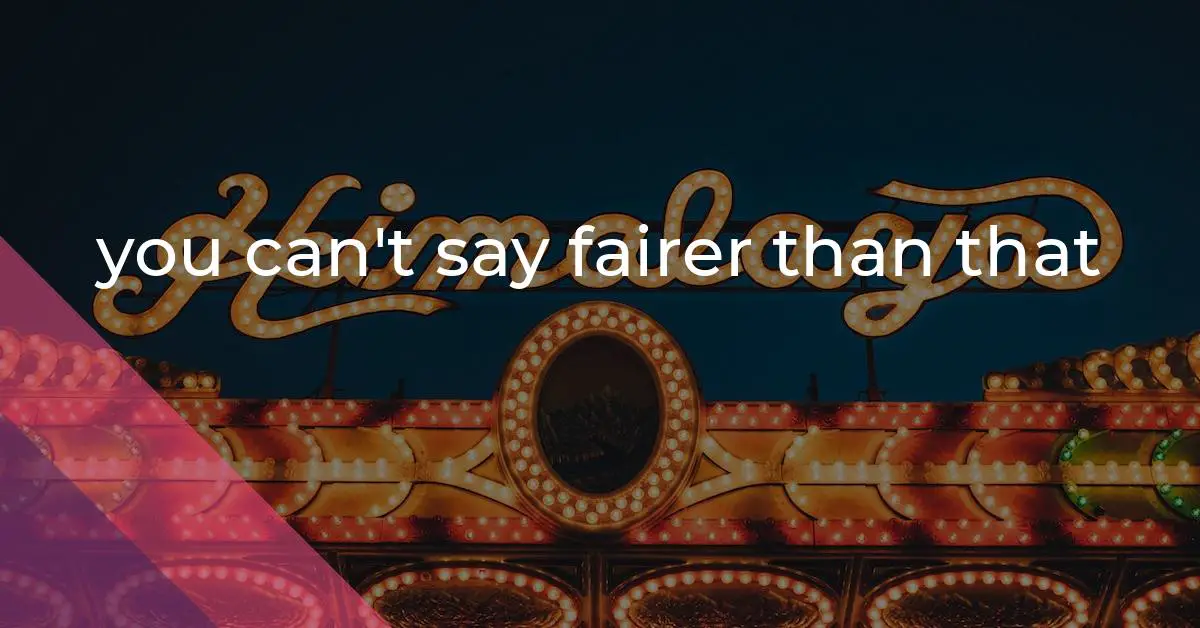you can’t say fairer than that: Idiom Meaning and Origin
What does ‘you can't say fairer than that’ mean?
The idiom "you can't say fairer than that" means that a situation or offer is as fair as it could possibly be, leaving no room for complaint or criticism.

Idiom Explorer
The idiom "you can't judge a book by its cover" means that you cannot predict the true nature or value of something just by its outward appearance.
The idiom "you can say that again" means that someone strongly agrees with what has just been said.
The idiom "what can I say" is used to express a feeling of helplessness or inability to find words in a situation. It often conveys resignation or the acknowledgement that there is nothing more to be said or done.
The idiom "too good to be true" means that something appears to be extremely good or favorable, but it is unlikely to be real or genuine.
The idiom "that's your lot" means that something has come to an end or there is nothing more to be expected or offered. It can be used to express that there is no more of something or that there is no further opportunity or possibility.
The idiom "that's saying something" is used to highlight a statement that is particularly noteworthy or impressive, often because it exceeds expectations or goes against common assumptions.
The idiom "tell you the truth" is a way to emphasize honesty in a statement, suggesting that the speaker is about to share their true thoughts or feelings on a matter. It signifies a candid and sincere expression.
An idiom meaning that one has to accept a situation or offer as it is, without the possibility of negotiation or change.
The idiom "raw deal" means to receive unfair treatment or a bad outcome in a situation.
Unveiling the True Essence
The idiom "you can't say fairer than that" is a commonly used expression in the English language. It is believed to have originated in the late 18th century, although the exact source of its origin is uncertain. The phrase is commonly used to indicate that something is fair or reasonable, and that no further negotiation or improvement is possible.
The meaning of this idiom is straightforward and can be easily understood. It is often used to emphasize the fairness of a proposal, statement, or offer. When someone says "you can't say fairer than that," they are expressing that the offer or statement made is as fair as can be expected, and that no further improvement or negotiation is possible or necessary.
One related idiom that conveys a similar meaning is "fair and square." This idiom is used to indicate that something has been done in an honest and just manner, without any cheating or unfairness involved. When someone says "we won fair and square," they are asserting that their victory or success was achieved in a fair and honest way, without any doubt or controversy.
Another related idiom is "give as good as one gets." This idiom is used to describe a person's ability to respond to an attack or criticism with an equal or even greater force. It emphasizes the idea of fairness and balance in a conflict or argument. When someone says "I can give as good as I get," they are asserting that they are capable of defending themselves or retaliating with the same level of intensity or skill.
"take it or leave it" is another related idiom that is often used in negotiations or discussions. It is a firm statement that indicates an offer or proposition is non-negotiable. When someone says "take it or leave it," they are essentially saying that the terms of the offer are final and not open to further discussion or modification. It conveys a sense of confidence and finality in the offer or proposition being made.
"fair enough" is a phrase that is often used as a response to a statement or proposition, indicating acknowledgement or agreement. It is a way of expressing acceptance or understanding of a situation or argument. When someone says "fair enough," they are essentially saying that they find the statement or proposition reasonable or acceptable, even if they may not fully agree with it. It is a way of acknowledging the validity or merit of another person's point of view.
For example, if someone offers to sell a car at a lower price than expected, the buyer might respond by saying "you can't say fairer than that," indicating that the offer is more than reasonable and doesn't require further negotiation. Similarly, in a business context, if one party proposes a deal with favorable terms, the other party may acknowledge the fairness of the offer by saying "you can't say fairer than that."
The idiom is often used in everyday conversations, both in formal and informal settings. It is most commonly used in British English, but it is also understood in other English-speaking countries, including the United States. The idiom does not have any regional variations or dialectal differences in meaning.
The idiom "you can't say fairer than that" is a well-established expression in the English language, dating back to the late 18th century. It is commonly used to emphasize the fairness of a proposal or statement, indicating that no further negotiation or improvement is possible or necessary. The idiom is widely understood and used in both formal and informal contexts. It conveys a sense of finality and completeness, while leaving room for the possibility of further fairness in future interactions.
Example usage
Examples of how the idiom "you can't say fairer than that" can be used in a sentence:
- He offered to pay for dinner and even drive everyone home, you can't say fairer than that!
- She promised to include free shipping and a 30-day money-back guarantee, you can't say fairer than that!
- The boss gave everyone a raise and an extra day off each month, you can't say fairer than that!
More "Expression" idioms



